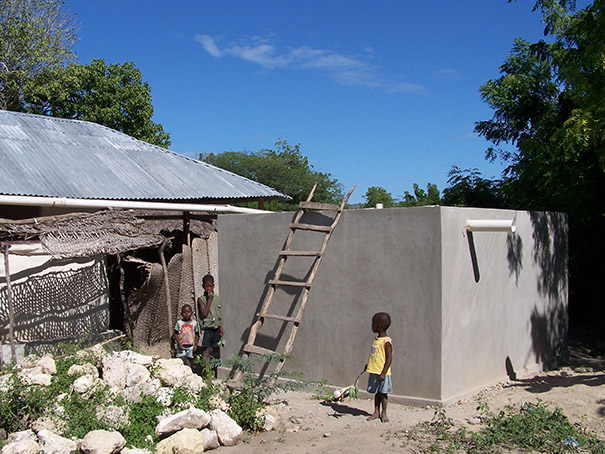
Water cisterns, built with concrete blocks, hold rain water collected from the house roof. Photo: CWS
Since July 2014, CWS has partnered with the Association for Rural Development of Haiti with a goal of improving food security and livelihoods of 42 farmers in the town of Lacoma. One element of this partnership is increasing access to water.
There is only one water source in Lacoma and no rivers. When there is no rain, there is no water and people have to walk great distances to obtain water. They store what water they can in barrels and buckets. CWS and ARDUH worked with the community to construct water cisterns for each of twelve houses. The community contributed food for workers as well as some of the labor. In the words of the recipients, “the cisterns symbolize hope.” Families who used to rely on neighbors for water now have water in their own yards. Residents now have water to bathe, cook, water gardens and more.
Thanks to these cisterns, families began planting vegetable gardens that can be easily watered. ADRUH has a team of agricultural technicians and agronomists who have trained families on the practices that they need to successfully cultivate vegetable gardens. The families have started composting and using that compost as fertilizer.
Families harvested an assortment of vegetables, including tomatoes, aubergine, cabbage, peppers, leeks, onions and beets. They are able to sell these vegetables to purchase other foods and goods for their households. Exalon Exinor explained that his wife, who was scheduled for surgery in six weeks’ time, was able to eat vegetables leading up to her surgery thanks to a cabbage harvest. As a result, her blood met the requirements for surgery, and she was able to go through with it. In Exalon’s words, “My garden gave life to my wife.”
The cisterns have another important benefit: the ability to plant trees. Cutting trees to make charcoal is a common income source in the community as a result of social and economic needs. However, trees play an important role in protecting against rain, wind and sun, preventing erosion, and increasing both nutrition and income. CWS and ADRUH are helping grow 15,000 trees – including 9,000 fruit trees – in nurseries that will later be transplanted into the community. The trees are being grown close to the cisterns for easy water access.
For the families in Lacoma, life has been transformed by convenient and local access to water.
